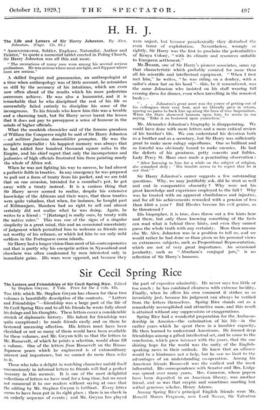H. H.J.
The Life and Letters of Sir Harry Johnston. By Alex. Johnston. (Cape. 12s. 6d.) " ADMINISTRATOR, Soldier, Explorer, Naturalist, Author and Painter," to quote a memorial tablet erected in Poling Church, Sir Harry Johnston was all this and more.
" The recreations of many men were among his several serious professions. He was serious where most are light, and flippant whore most are serious."
A skilled linguist and grammarian, an anthropologist at a time when anthropology was of little account, he astonishes us still by the accuracy of his intuitions, which are even now often ahead of the results which his more pedestrian successors achieve. He was also a humourist, and it is temarkable that he who disciplined the rest of his life so successfully failed entirely to discipline his sense of the incongruous. To his friends who 'mew him this was a lovable and a charming trait, but Sir Harry never learnt the lesson that it does not pay to presuppose a sense of humour in the minds of higher officials.
What the monkish chronicler said of the famous grandson of William the Conqueror might be said of Sir Harry Johnston
—ad militare fascinus damnabiliter promptus. He was the complete imperialist : his happiest memory was always that
he had added four hundred thousand square miles to the Empire, and his chief regret that only the incompetence and jealousies of high officials frustrated him from painting nearly the whole of Africa red.
When he was not fighting his way to success, he had almost a pathetic faith in treaties. In any emergency he was prepared
to pull out a form of treaty from his pocket, and we are told that on one occasion, intended for a cannibal's pot, he got away with a treaty instead. It is a curious thing that Sir Harry never seemed to realize, despite his extensive knowledge of the Africans and their ways, that these treaties were quite valueless, that when, for instance, he bought part of Kilimanjaro, Mandara had no right to sell and almost certainly did not realize what he was doing. Again, he writes to a friend : " [Katanga] is really ours, by treaty with the native ruler." This was one of the signs of a singular simplicity in a great mind, this and an occasional uncertainty of judgment which permitted him to welcome as friends men not worthy of his reliance, or which led him to see only mild serfdom in the Portuguese cocoa islands.
Sir Harry had a longer vision than most of his contemporaries and that is partly why his energetic action in Nyassaland and elsewhere was often condemned by men interested only in immediate gains. His wars were opposed, not because they
were unjust, but because paradoxically they disturbed the even tenor of exploitation. Nevertheless, wrongly or rightly, Sir Harry was the first to proclaim the potentialities
of Kenya Colony, " with its climate and resources suitable to European settlement."
Mr. Swann, one of Sir Harry's pioneer associates, sums up that characteristic which probably counted for more than all his scientific and intellectual equipment. " When I first met him," he writes, " he was riding on a donkey, with a sailor's straw hat on his head "—this, be it remembered, was the same Johnston who insisted on his staff wearing full evening dress for dinner, even when travelling in the remotest bush :--
" . . . Johnston's great asset was the power of getting out of his colleagues their very best, and we liberally gave in return, sparing no pains to back him up along the lines of true Imperialism. When the State showered honours upon him, he wrote to me saying, Take it as bestowed upon yourselves.' "
Mr. Alexander Johnston's biography is disappointing. We could have done with more letters and a more critical review of his brother's life. We can understand his devotion both as a brother and as a secretary, but Sir Harry was sufficiently great to make mere eulogy superfluous. One so brilliant and so forceful was obviously bound to make enemies. He had the defects of his greatness, petty conceits and foibles. Lady Percy St. Maur once made a penetrating observation :
" After listening to him for a while on the subject of religion, she remarked drily : ' His trouble seems to be regret that he is not God.' "
Sir Harry Johnston's career suggests a few outstanding questions. Why, we may justifiably ask, did he start so well
and end in comparative obscurity ? Why were not his great knowledge and experience employed to the full ? Why was he treated with an apparent churlishness and injustice, and for all his achievements rewarded with a pension of less than £500 a year ? Did Rhodes become his evil genius, as
he threatened ?
His biographer, it is true, does throw out a few hints here and there, but only those knowing something of the facts can read what is behind these hints, and even they cannot guess the whole truth with any certainty. More than anyone else Mr. Alex. Johnston was in a position to tell us, and we would rather he had done so than given us his personal views on extraneous subjects, such as Proportional Representation, which are not of very great importance. An occasional jocularity, such as " Abraham's conjugal jars," is no reflection of Sir Harry's humour.








































 Previous page
Previous page